‘Isolated, anxious and unable to leave my room’: Brooke Buschkuehl ready for Paris Olympics after overcoming mental health battles
Mentally, Brooke Buschkuehl was fried. Physically, she struggled to put one foot in front of the other. The medal hopeful unpacks a year that left her questioning whether she should even bother trying to qualify for Paris.
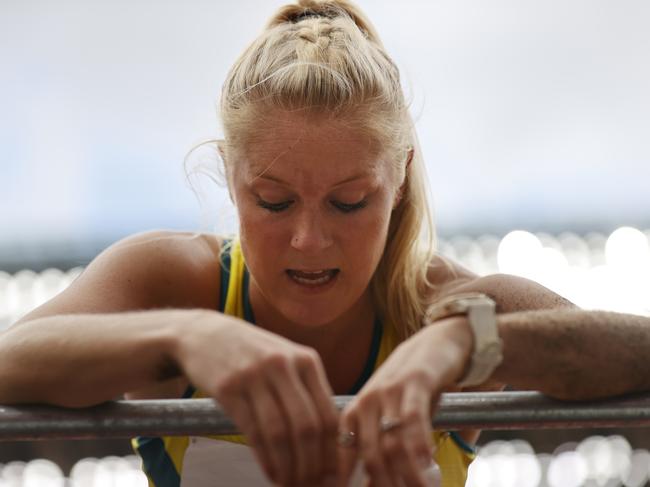
Olympics
Don't miss out on the headlines from Olympics. Followed categories will be added to My News.
Brooke Buschkuehl takes a deep breath and begins to unpack a year that left her questioning whether she should even bother trying to qualify for a third Olympic Games.
There were days when she was so gripped by depression and anxiety, she struggled to leave her hotel room, let alone compete against the world’s best.
Mentally, Buschkuehl was fried. Physically, she struggled to put one foot in front of the other. A veteran of the Rio and Tokyo Games who at her best can contend for a medal in Paris, Buschkuehl was distracted, exhausted and wondering whether it was time to do something else.
The long jump was the last thing on her mind.
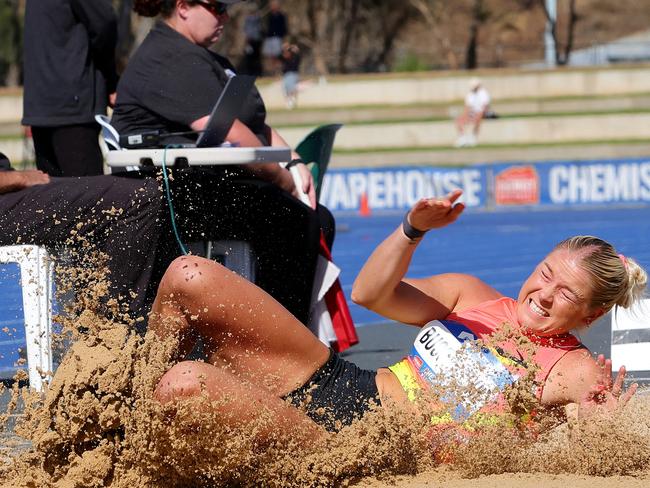
“I was just really not myself,” Buschkuehl said. “Just physically, you know, I was struggling from a lot of mental fatigue that I was experiencing just from all the overthinking and all the anxiety and the low moods.
“I guess I just started getting more so performance anxiety. I think that probably just triggered a lot of the negative thoughts and negative emotions around competing. I was isolating myself a lot and really struggling with motivation. So a lot of that was really impacting my ability just to enjoy my athletics and find that love that I always had for the sport.
“And a lot of last year I spent sort of weighing up whether I wanted to keep going and whether I still actually enjoyed the sport and training for it. I think all year I was just really stubborn and I guess as athletes were are really wired to just keep going when things are tough.
“And I kind of just had that mentality to keep pushing through all these struggles and all these negative thoughts. Just got to the point where the season finished and I just sort of felt broken.
“I didn’t know what I wanted to do, whether I wanted to keep going. I was just in this like really hard predicament and ended up reaching out for help.”
Bottoming
Buschkuehl reached her nadir at last year’s Diamond League final in America, where she finished in fourth place with a jump of 6.71m that defied the personal drama she was going through.
She had already beaten the odds to forge an outstanding athletic career while battling coeliac disease and Hashimoto’s disease — two auto-immune diseases that meant she had to be continually vigilant about what she ate and the health of her thyroid. This time, she had blood tests before she headed overseas and the results suggested everything was okay.
It wasn’t.
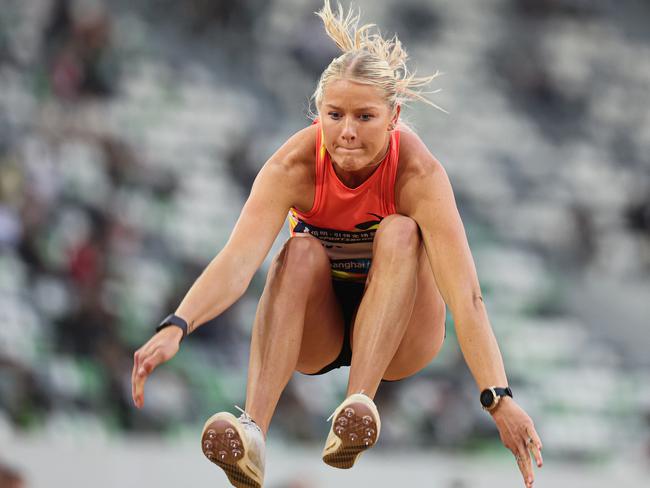
“When I was overseas last year before (the world championships in) Budapest, I knew that I wasn’t right, I knew that I didn’t feel my happy self,” she said.
“I didn’t truly acknowledge that I needed to reach out for help until after I got back from the Diamond League final.
“I was just so down and just feeling so confused as to why I had been feeling the way I had been feeling, whether I wanted to continue on with my athletics and how that was all going to look. Also, whether I needed to find a job on the side to sort of give myself some sort of enjoyment in a different avenue in my life.
“So basically when I got back from Diamond League final, I was about to start a job as a personal trainer at F45. And I remember going along for a couple of shadow shifts and I just felt down, like, so sad. I came home, I was in tears, and I just remember not feeling like myself.
“My passion for health and fitness has always been something that has always been there. But I just had no interest at all. I couldn’t see myself starting a job and that was sort of the moment where I was like, yeah, I need to acknowledge how I’m feeling right now and do something about it.”
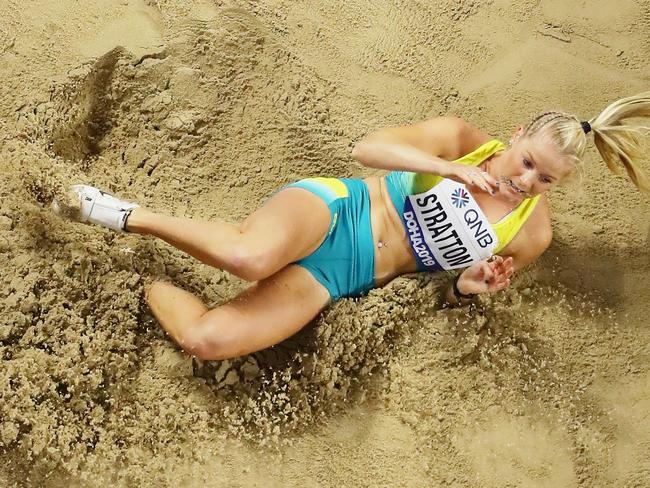
Buschkuehl decided it was time to seek help. However, before things got better, they got worse after she reacted poorly to her initial antidepressants.
“So I started them in October last year and was experiencing a lot of like drowsiness and fatigue and was making it really, really difficult to be able to train and compete,” she said.
“But I stayed on it until February and had some pretty crap results to be completely honest. A lot of it was because my body was just half asleep when I was on the runway trying to jump, I couldn’t think properly, I had, like, cognitive impairment.
“It was just almost like the lights are on, but no one was home and trying to run down the runway as fast as you can and launch yourself into the pit, it was extremely difficult.
“I think towards the end of February – after a meet I did in Christchurch where I was just experiencing all of the above – made the decision with my psychiatrist to change my medication.”
Going public
Again, the results weren’t immediate. She arrived at the Sydney Track Classic in March and finished third, jumping 6.27m, almost one metre below her personal best of 7.13m set two years ago in America.
After that performance, Buschkuehl decided to share her struggles with the world, posting about her battles on social media. The response was overwhelming and her results since have begun to turn the corner.
“I was experiencing side effects from starting the new medication and was also experiencing like withdrawals from coming off the previous one,” Buschkuehl said.
“So it was just a really, really rough time and mentally when you start an antidepressant, you pretty much go backwards for a while until your body adjusts to it.
“So I was getting really bad anxiety. My moods were really low, a lot of tears. I couldn’t accept the fact that I was jumping some of the distances I was jumping. I couldn’t think straight, couldn’t think clearly.
“That sorted itself out leading into nationals – I started feeling myself again and I had a decent result there, and then my psychiatrist upped my dose after that, right before I went to China for a Diamond League and I had an absolutely horrible result.
“It really knocked me around. Thankfully no changes have been made since then and I feel like I’m definitely on the way out. I’m feeling great mentally, physically.”
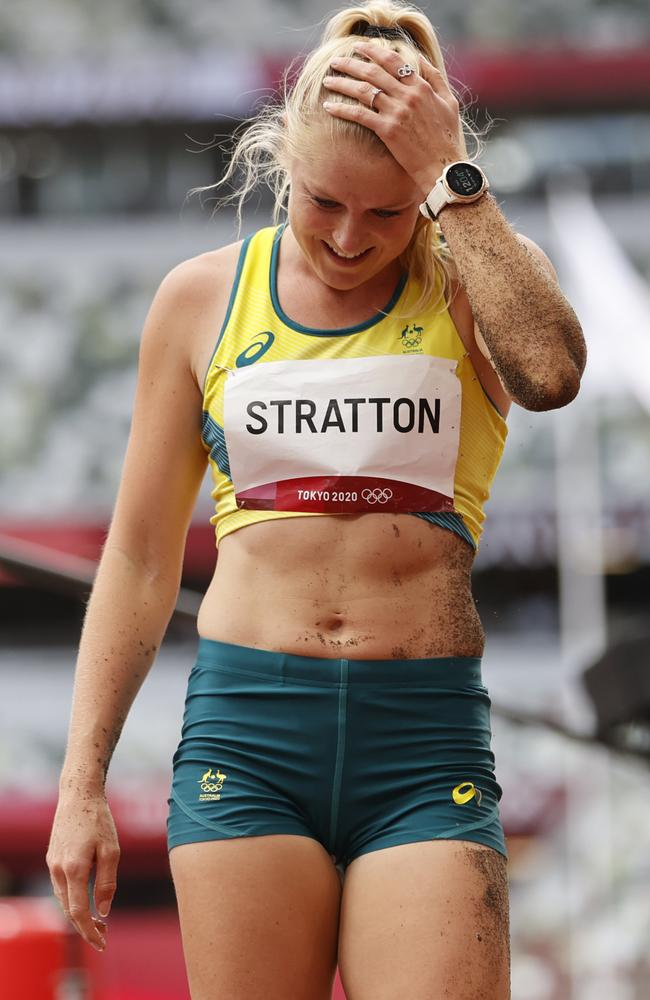
Well enough to believe she can compete for a medal in Paris. She finished seventh in Rio and Tokyo and while her preparation hasn’t been as good — she flew to France at the last minute after deciding she was better placed preparing in Australia — there have been signs in her training that a big jump is possible.
She only needs one.
“I feel like I’ve got the experience under my belt competing on the world stage now,” she said. “So it’s not something that I think is going to be super daunting for me. I feel like I can go in and feel comfortable enough knowing that I belong out there.
“I haven’t got that big jump really against my name this season. But I feel like my training’s definitely picked up. I guess just the way that I feel like physically, I’ve been feeling great, mentally in a really good place.
“I think that is the two probably most important aspects of being a professional athlete, being in a good physical and mental place.
“I think if I can rock up to Paris and produce a jump that I know is definitely in me and been waiting to come out for a while.”
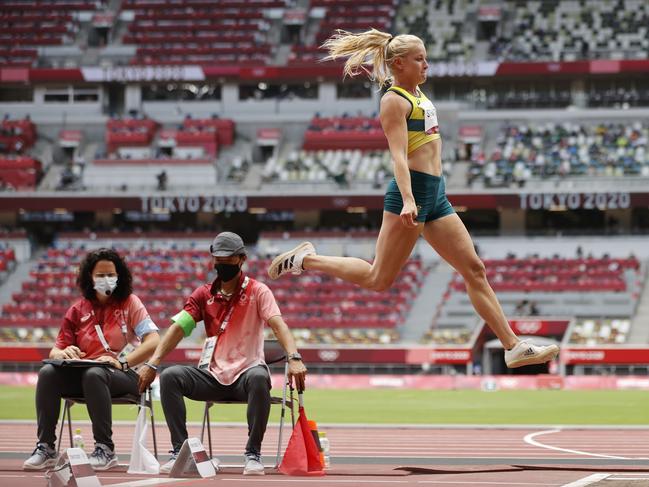
The future
Regardless of the result in Paris, Buschkuehl has her life back. Now 30, she can see some blue sky after a long period of darkness. Ultimately, that is more important and significant than a gold medal.
“I never sort of imagined that I’d need to break down this path and be on antidepressants, but I’m actually really proud of myself,” Buschkuehl said.
“For speaking up about it and also just finding the strength to be able to reach out and talk to someone. Whether it meant going on medication to make myself feel better, I’m not ashamed of that is.
“I feel like speaking up about it is super important. So if I can share my story and speak up about it and allow other athletes or just people in general to be able to reach out and speak to someone if you know that feeling similar things, then that’s really important.
“It definitely hasn’t been an easy time for me. It’s definitely been the hardest team to make, throughout my career so far. And, I mean, making Rio was super special, being my first Olympic Games and having had a dream of getting to an Olympic Games since I was in grade one.
“So that was, that was really special. But I think this time around, being able to really sort of pulled myself self out of some pretty, pretty rough struggles with mental health.
“Yeah it just makes this one feel special in a different way.”





